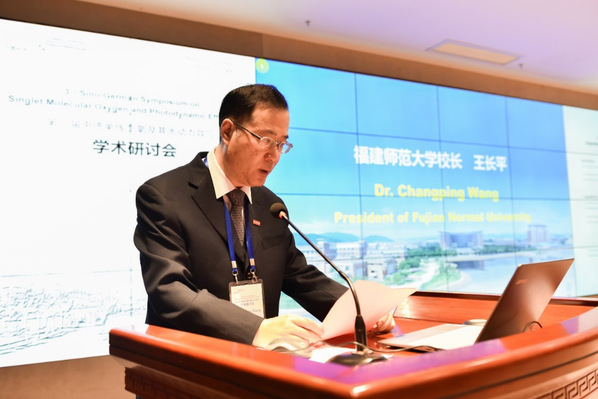
From April 9 to April 11, the 3rd Sino-German Bilateral Symposium on Singlet Molecular Oxygen and Photodynamic Effects, funded by the Sino-German Center of the National Natural Science Foundation of China (NSFC) and co-hosted by FNU and Humboldt-Universität zu Berlin (HUB), was held in Fuzhou. Twelve German experts from German universities and research institutions, such as HUB, Ludwig-Maximilians-Universität, Ernst Moritz Arndt University of Greifswald, Tierärztliche Hochschule Hannover, Fraunhofer ISE, Charité, twenty-five Chinese experts from Zhejiang University, Shanghai Jiaotong University, Huazhong University of Science and Technology, Xi’an Jiaotong University, Chinese Academy of Sciences, Xiamen University, Dalian University of Technology, China Pharmaceutical University, Nanjing University of Aeronautics and Astronautics, South China Normal University, Shenzhen University, Chinese People’s Liberation Army General Hospital, Shanghai Dermatology Hospital, Mengchao Hepatobiliary Hospital of Fujian Medical University, Fuzhou University and FNU, and two third-party experts from University of Toronto in Canada and Saint Paul University in Brazil, attended the symposium. Karin Zach, German director of the Sino-German Center, Baiyu Zhang, the executive deputy director of the Sino-German Center, Lin Bode, the deputy director-general of Fujian Provincial Department of Science and Technology, Chen Qian, head of the Foundation Office of Fujian Provincial Department of Science and Technology, FNU President Wang Changping, and heads of the Department of Science and technology and the College of Photonic and Electronic Engineering of FNU, attended the opening ceremony. The symposium also attracted more than seventy teachers and students from domestic and foreign universities and research institutions at their own expenses.
At the opening ceremony, on behalf of FNU, President Wang Changping delivered a speech to extend a warm welcome to the experts present and thanked the Sino-German Center and Fujian Provincial Department of Science and Technology for their long-time concern and guidance. He expressed the hope that the academic workshops will further strengthen the academic cooperation and exchanges between FNU and Germany as well as other domestic and foreign universities and research institutions to promote the high-quality development of the school undertakings. Lin Bode, on behalf of Fujian Provincial Department of Science and Technology, thanked the Sino-German Center for supporting science and technology in Fujian Province and briefly introduced the achievements made thanks to scientific and technological innovation-driven development in Fujian. He hoped that FNU will establish broader and closer partnerships with other domestic and foreign universities, research institutions as well as the science and technology workers. Karin Zach expressed his congratulations that the symposium was successfully held and on behalf of the Deutsche Forschungsgemeinschaft (DFG, German Research Foundation), he introduced the latest funding policies of DFG. Beate Röder, German chairman of the symposium and professor of the Institute of Physics of HUB, made a speech at the opening ceremony. The opening ceremony was chaired by Li Buhong, Chinese chairman of the symposium and professor of the College of Photonic and Electronic Engineering of FNU.
At the symposium, Baiyu Zhang gave a detailed introduction to the representatives about the history of the Sino-German Center, the categories of project funding and the funding application. Forty-one experts present made academic reports, which centred around the following six themes: the generation mechanism and the detecting technology of photo-sensitized singlet molecular oxygen, the singlet-molecular-oxygen-mediated photodynamic effects, the photodynamic inactivation of microorganisms, a new type of photosensitizer and its targeted transmission, the optical detection of photodynamic therapy dose, the clinic photodynamic therapy and its latest developments. During the symposium, the representatives visited the Archive of FNU History.
It was reported that the 3rd Sino-German Bilateral Symposium was jointly applied by Professor Beate Röder and Prof. Li Buhong to the Sino-German Center for the third time, and got approved. The symposium summarized the latest research achievements made by China and Germany in the field of singlet molecular oxygen and photodynamic effects and provided a high-level academic exchange platform for continuing to enhance the Sino-German cooperative researches.
(Translated by Ye Zhi, Reviewed by Xie Xiujuan)
